When integrating altcoin data into Web3 apps or platforms, choosing the right altcoin API becomes pivotal. But what is the best option to get altcoin API data feeds? This article will highlight Moralis’ altcoin API suite and explore each API for fetching and integrating altcoin data into your decentralized applications (dapps). With only single lines of code, you can use our premier APIs to query token prices, transfers, advanced market data, and much more. Consequently, when working with Moralis, you can seamlessly build everything from decentralized finance (DeFi) platforms to portfolio trackers without breaking a sweat!
If you’re eager to jump straight into the code and want a little sneak peek of what’s to come, then check out the three endpoints below, which you’ll likely find helpful in your development endeavors:
getTokenPrice() – Fetch the price of any altcoin: const response = await Moralis.EvmApi.token.getTokenPrice({
“chain”: “0x1”,
“address”: “0x7d1afa7b718fb893db30a3abc0cfc608aacfebb0”
}); getWalletTokenBalances() – Query the token balances of any wallet: const response = await Moralis.EvmApi.token.getWalletTokenBalances({
“chain”: “0x1”,
“address”: “0x1f9090aaE28b8a3dCeaDf281B0F12828e676c326”
}); getTopERC20TokensByMarketCap() – Fetch the top ERC-20 altcoins by market cap: const response = await Moralis.EvmApi.marketData.getTopERC20TokensByMarketCap();
To learn more about Moralis’ premier development tools, check out our official Web3 API page!
Also, if you want to follow along in this tutorial, don’t forget to sign up with Moralis. You can create an account for free, and you’ll be able to start building dapps faster and more efficiently!
Overview
In today’s article, we’ll kick things off by answering the question, ”What is an altcoin API?”. In doing so, we’ll explain what they are and why you should use them when building Web3 projects. From there, we’ll then introduce you to Moralis, as our industry-leading Web3 API suite is the ultimate tool for fetching and integrating altcoin data into your dapps. Next, we’ll walk you through a comprehensive tutorial to show you how to get altcoin data with Moralis in three steps:
Step 1: Get a Moralis API KeyStep 2: Write a Script Calling the getTokenPrice() Endpoint Step 3: Run the Code
Lastly, to top things off, we’ll cover some prominent use cases for setting up altcoin API data feeds with Moralis.
If this sounds exciting, join us below as we start by exploring the ins and outs of altcoin APIs!
What is an Altcoin API?
An altcoin API (application programming interface) is a set of rules, methods, and protocols that allow you to seamlessly interact with blockchain networks to fetch and integrate altcoin data into your Web3 projects!

An altcoin API can offer a wide range of features. Below, you’ll find three prominent examples:
Real-Time and Historical Data: Altcoin APIs deliver access to real-time cryptocurrency data, including prices, extensive metadata, account balances, and transactions. Furthermore, these interfaces often feature expansive archives of historical data, which is essential for in-depth analysis and the creation of charts. Advanced Market Insight: Premier altcoin APIs go beyond basic data provision by offering in-depth market insights. This includes information on trending cryptocurrencies, price changes over time, market capitalization data, and other critical financial metrics. Such detailed data is invaluable for end users, allowing them to make informed investment decisions and understand market dynamics. Notifications and Alerts: The best altcoin APIs also empower developers to effortlessly integrate customizable notifications and alerts within their dapps. Features like this ensure that end users stay informed about real-time market movements and critical updates without missing a beat.
All in all, an altcoin API is a set of protocols, methods, and rules allowing you to seamlessly fetch and integrate altcoin data into your Web3 projects!
Why Developers Should Use an Altcoin API when Setting Up Data Feeds?
Communicating with a blockchain network requires a complex underlying infrastructure, which is both a tedious and time-consuming task to set up. Fortunately, this is where APIs enter the equation, allowing you, as a developer, to query the various blockchain networks without having to reinvent the wheel!

When using an altcoin API, you can leverage premade protocols and methods to fetch altcoin data without having to understand and deal with any underlying complexities yourself. In return, you can save a lot of development time and resources, which can be allocated to more critical aspects of your projects, such as building a compelling user experience and improving user value.
So, by utilizing an altcoin API, you can build decentralized finance (DeFi) projects, cryptocurrency wallets, portfolio trackers, and any other Web3 platform faster and more efficiently!
What’s the Best API for Altcoin Data Feeds?
There are several prominent Web3 API providers on the market for fetching and integrating altcoin data. However, among the top alternatives, Moralis clearly stands out as the industry leader! But what exactly is Moralis? And what makes Moralis’ API suite the best alternative for fetching altcoin data?
Moralis is an industry-leading Web3 API provider, and in our altcoin API suite, you’ll find premier interfaces such as the Token API, Market Data API, Streams API, and many others. With these tools, you can seamlessly fetch and integrate on-chain altcoin data into your Web3 projects with only single lines of code!
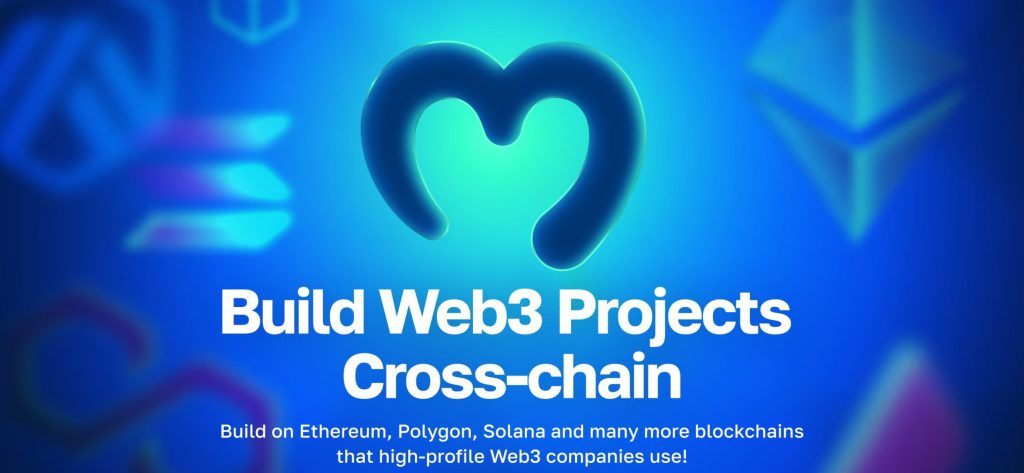
But why should you use Moralis’ API suite to get and integrate altcoin data?
Comprehensive: We enrich all our API responses with transaction decodings, market data, address labels, metadata, and more from multiple sources. In doing so, Moralis is able to offer the industry’s most comprehensive APIs. Save Time: With the power and accessibility of Moralis’ APIs, you can seamlessly reduce the average time to market for all your projects by an impressive 83%. Cross-Chain Compatibility: Our APIs are chain agnostic, supporting networks like Ethereum, Polygon, BNB Smart Chain, Optimism, and many others. As such, when working with Moralis, you can build cross-chain compatible dapps without breaking a sweat.
Also, did you know you can access our premier Web3 API suite for free? So, if you haven’t already, make sure to sign up with Moralis straight away.
Now, with an overview of Moralis, let’s explore three prominent interfaces of our Web3 API suite that can help you seamlessly fetch and integrate altcoin data into your projects!
Token API
Moralis’ Token API is the industry’s leading tool for real-time and historical altcoin data. This API supports all tokens across ten+ EVM chains, including everything from meme coins like Shiba Inu (SHIB) to stablecoins like USDT!
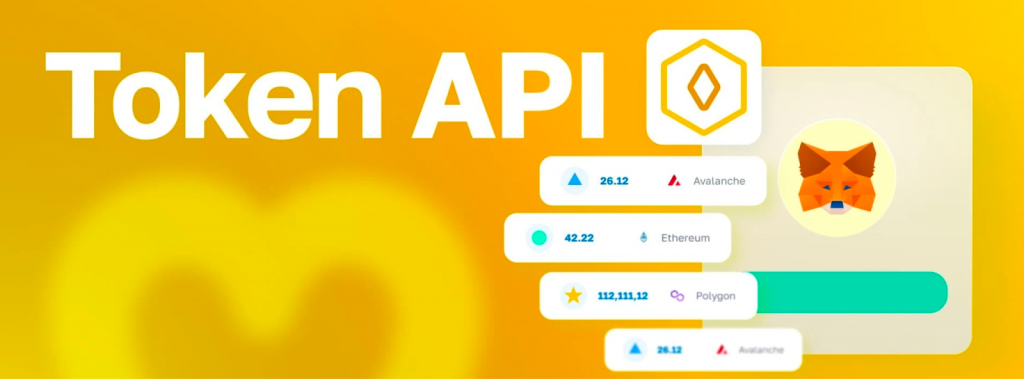
With only a couple of lines of code, you can use the Token API to seamlessly get token transfers, balances, prices, metadata, and much more. Consequently, with this interface, you can easily build everything from DeFi platforms to portfolio trackers.
To highlight the capabilities of the Token API, here are three prominent endpoints you’ll likely find helpful when building dapps:
getTokenPrice() – Get the price of any altcoin: const response = await Moralis.EvmApi.token.getTokenPrice({
“chain”: “0x1”,
“address”: “0x7d1afa7b718fb893db30a3abc0cfc608aacfebb0”
}); getWalletTokenBalances() – Query altcoin balances of any wallet:const response = await Moralis.EvmApi.token.getWalletTokenBalances({
“chain”: “0x1”,
“address”: “0x1f9090aaE28b8a3dCeaDf281B0F12828e676c326”
}); getWalletTokenTransfers() – Fetch all altcoin transfers of any wallet: const response = await Moralis.EvmApi.token.getWalletTokenTransfers({
“chain”: “0x1”,
“address”: “0x1f9090aaE28b8a3dCeaDf281B0F12828e676c326”
});
Market Data API
The Moralis Market Data API lets you seamlessly unlock the power of advanced cryptocurrency market data. With this API, you can effortlessly keep an eye on top altcoins and monitor the market’s largest gainers and losers. As such, this is the ultimate tool for anyone looking to build DEXs, portfolio trackers, cryptocurrency wallets, and other DeFi platforms!
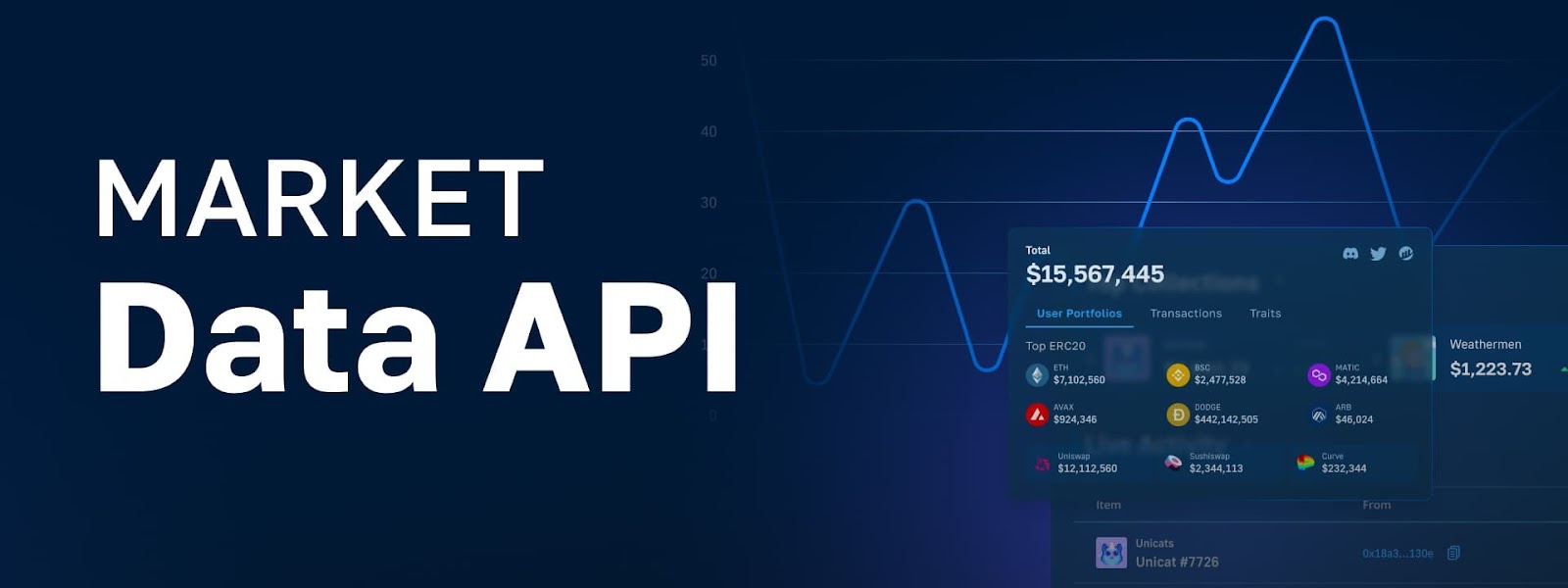
In terms of altcoin data, the Market Data API features two prominent endpoints:
getTopERC20TokensByMarketCap() – Fetch the top ERC-20 tokens by market capitalization:const response = await Moralis.EvmApi.marketData.getTopERC20TokensByMarketCap(); getTopERC20TokensByPriceMovers() – Query the top ERC-20 tokens by price change:const response = await Moralis.EvmApi.marketData.getTopERC20TokensByPriceMovers();
Streams API
With Moralis’ Streams API, you can effortlessly set up real-time altcoin data feeds to get customizable updates sent directly to the backend of your projects via webhooks as soon as something important happens on-chain. As such, the Streams API is the ultimate tool for integrating Web3 alerts and notifications into your project!
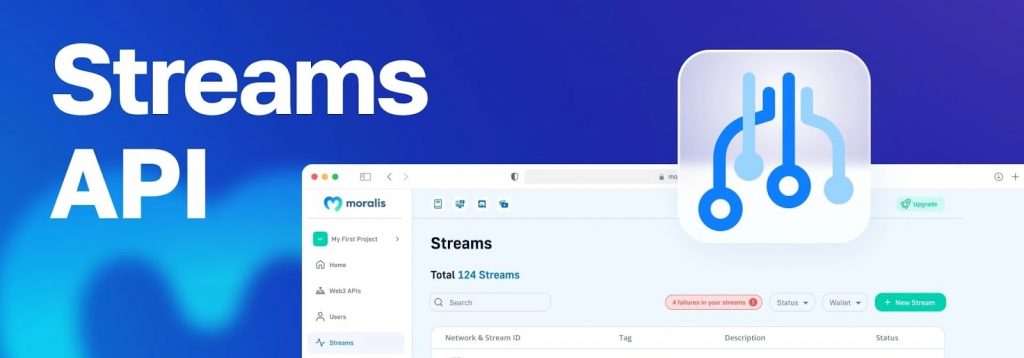
So, how does the Streams API work?
Well, you can create a stream in three straightforward steps:
Step 1 – Create a new stream object by specifying what chains you want to monitor, events you wish to track, and a webhook destination:
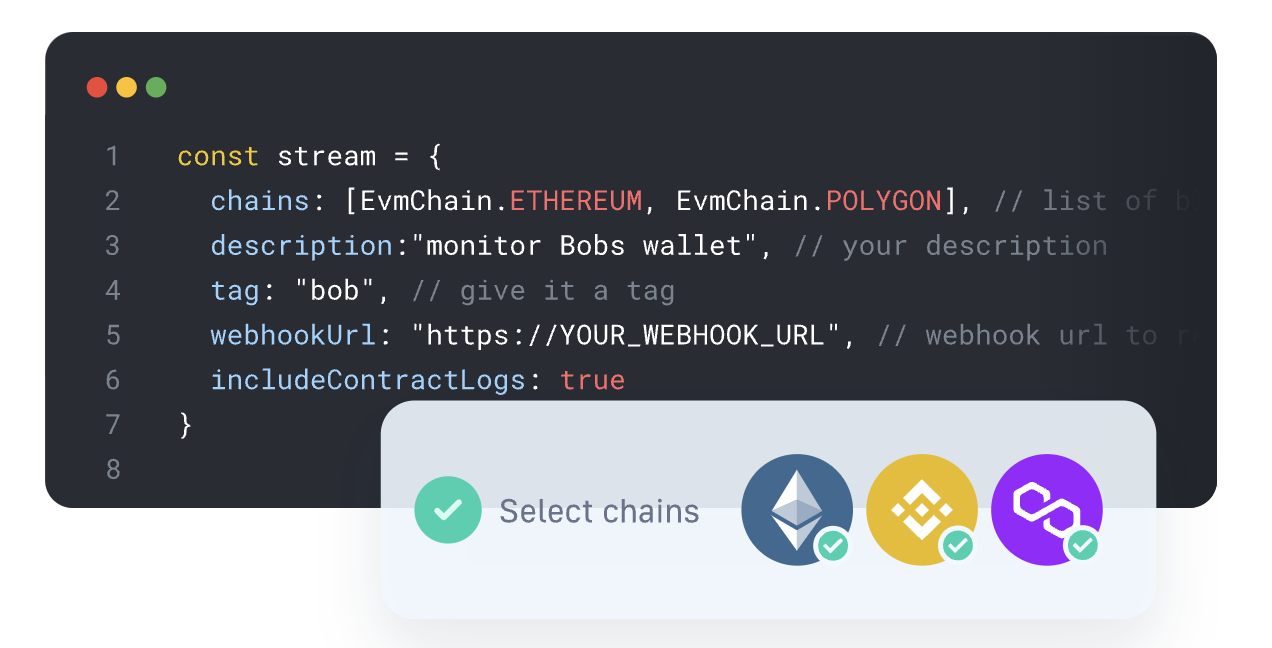
Step 2 – Set up a new stream using your stream object:
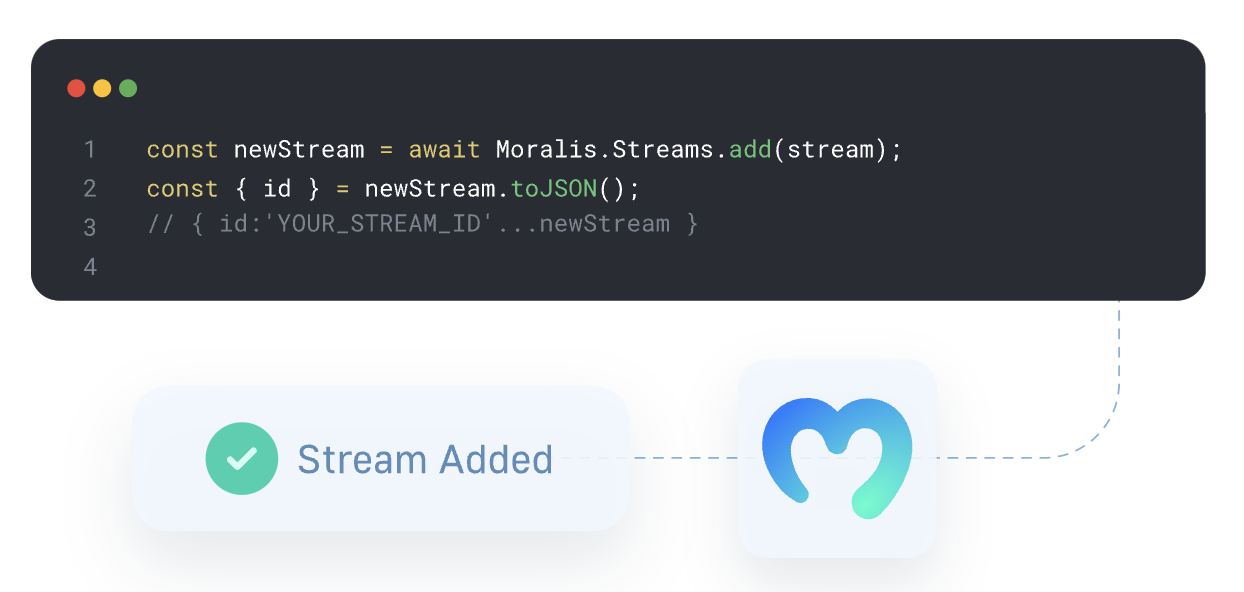
Step 3 – Add the address(es) you want to monitor and watch the data stream in:
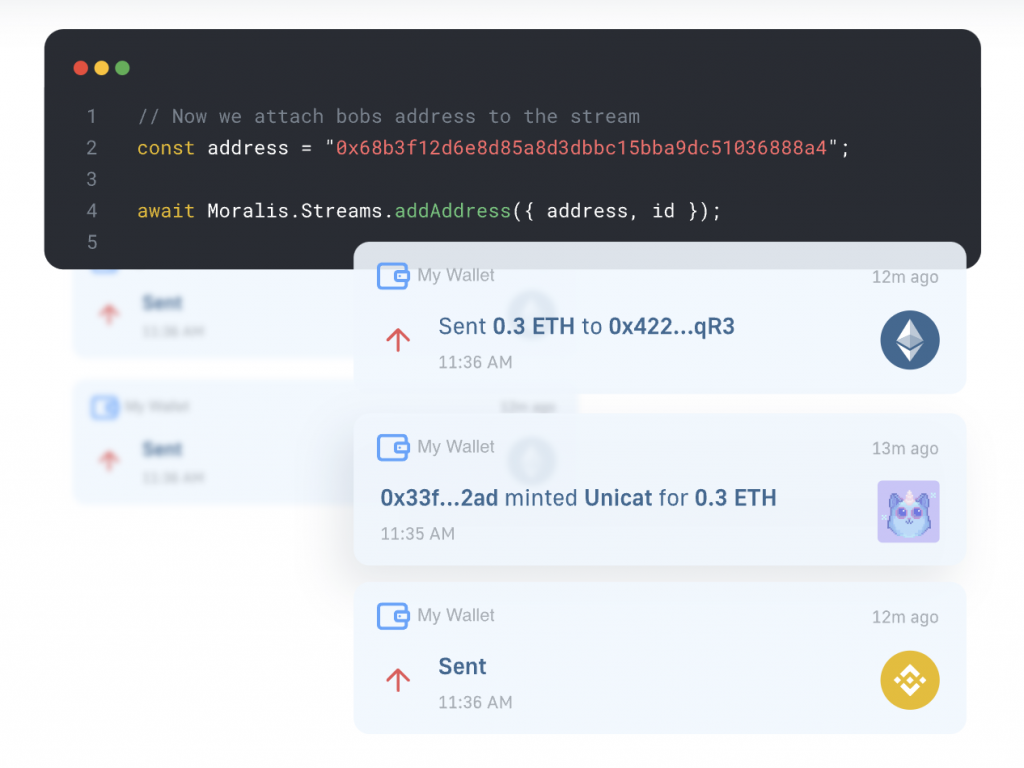
For a more detailed breakdown of the process above, please check out our official Streams API documentation page!
How to Set Up Altcoin API Data Feeds with Moralis
With an overview of Moralis’ APIs for altcoins, we’ll take this section to briefly walk you through the process of setting up altcoin API data feeds with our industry-leading tools. To do so, we’ll be using the getTokenPrice() endpoint as an example and show you how to get real-time altcoin prices in three straightforward steps:
Step 1: Get a Moralis API KeyStep 2: Write a Script Calling the getTokenPrice() Endpoint Step 3: Run the Code
However, before we can continue, you must take care of a few essential prerequisites!
Prerequisites
Moralis’ altcoin API suite is compatible with multiple programming languages, including Python, TypeScript, etc. However, for this tutorial, we’ll be using JavaScript. As such, before you proceed, make sure you have the following ready:
Step 1: Get a Moralis API Key
If you haven’t already, the first thing you need to do is sign up with Moralis by clicking on the ”Start for Free” button at the top right of the Moralis homepage:
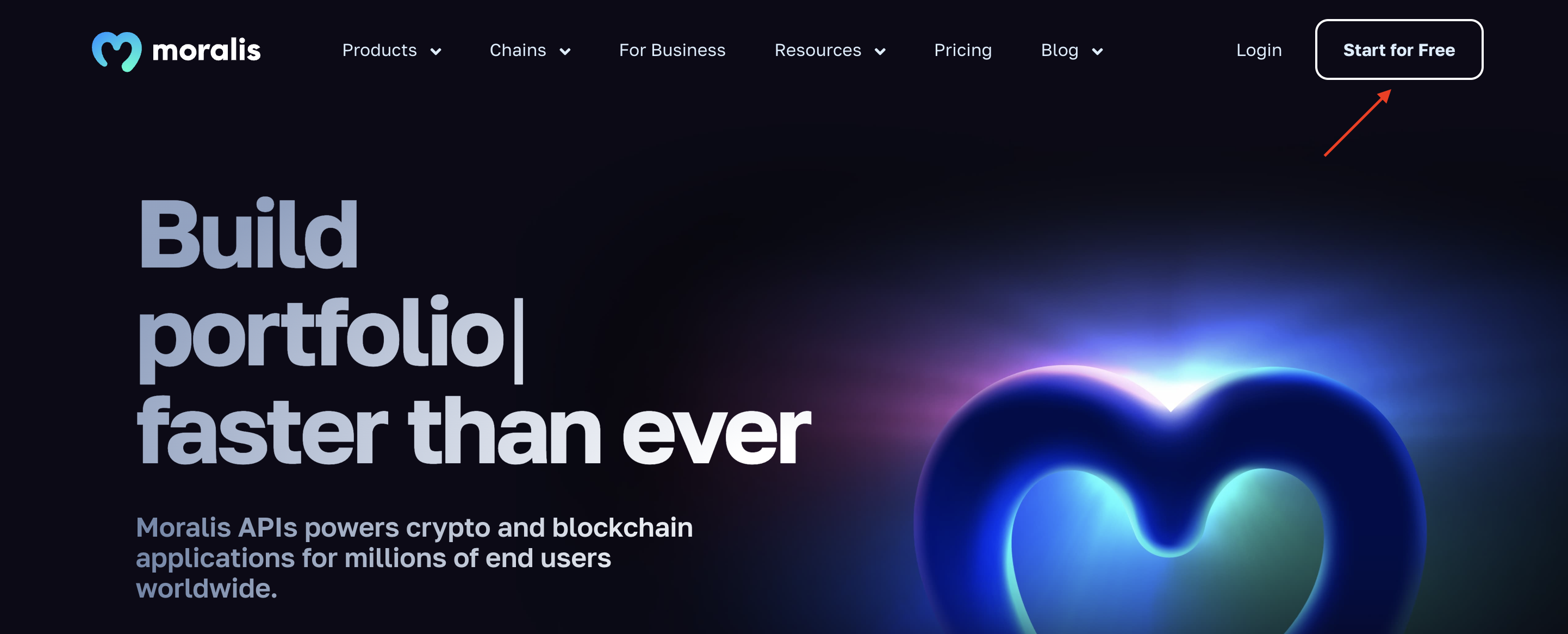
Once you’re done creating your Moralis account and project, you’ll find your API key under the ”Settings” tab to the left:
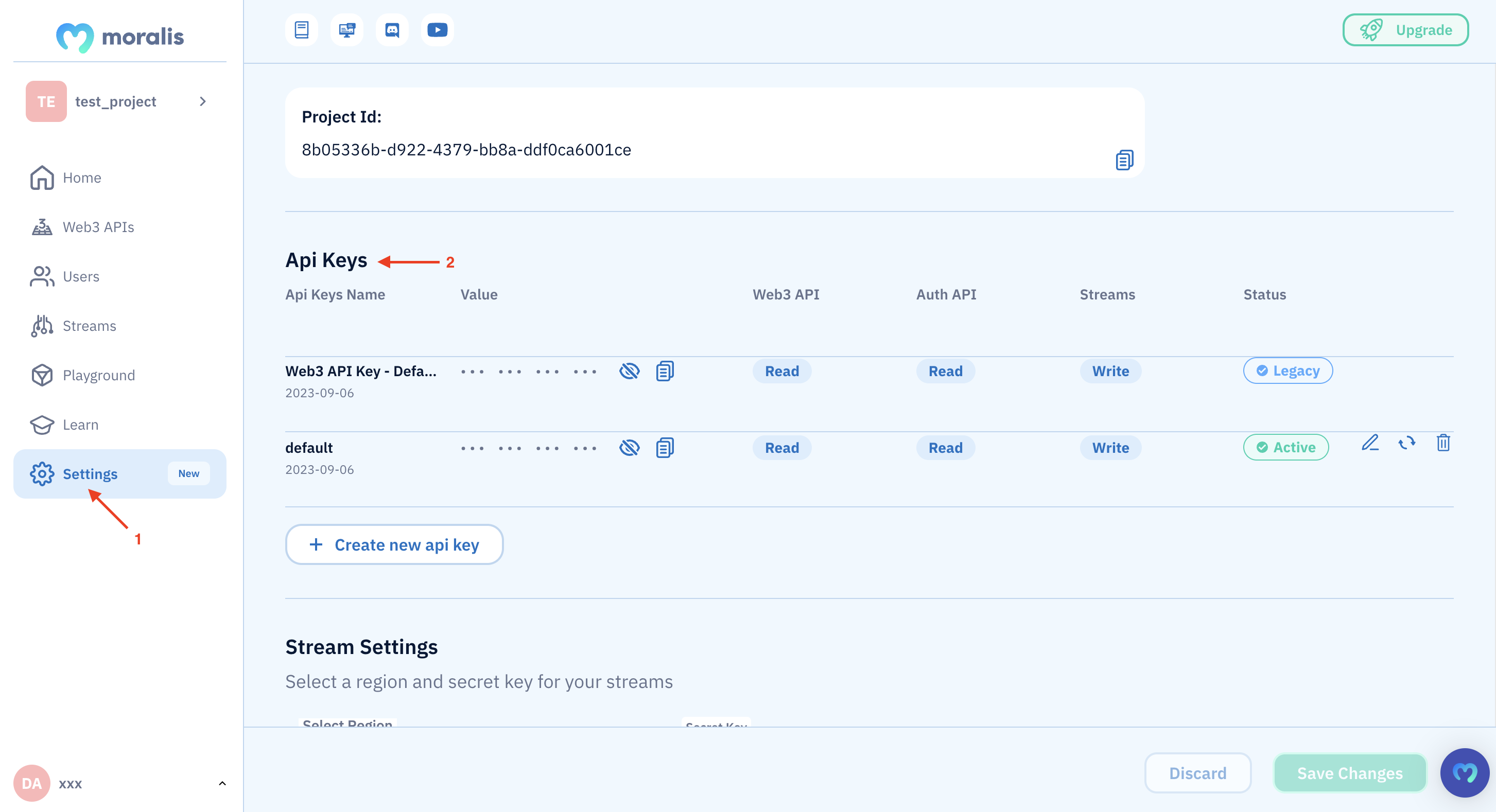
Copy and keep the key for now, as you’ll need it during the next step to initialize Moralis.
Step 2: Write a Script Calling the getTokenPrice() Endpoint
Open your IDE and initialize a new project by running the following command in the terminal:
npm init
Next, make sure to run the terminal command below to install the Moralis SDK:
npm install moralis @moralisweb3/common-evm-utils
You can then open your ”package.json” file and add ”type”: ”module” to the list:
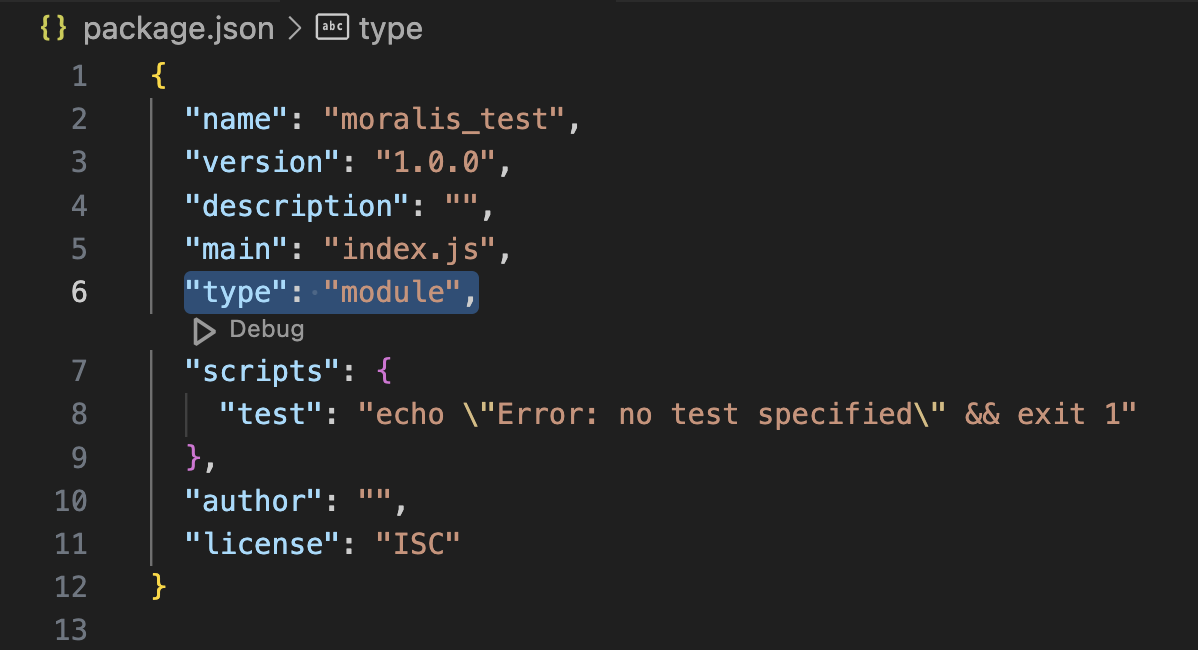
From here, create a new ”index.js” file and add the following code:
import Moralis from ‘moralis’;
try {
await Moralis.start({
apiKey: “YOUR_API_KEY”
});
const response = await Moralis.EvmApi.token.getTokenPrice({
“chain”: “0x1”,
“address”: “0x7d1afa7b718fb893db30a3abc0cfc608aacfebb0”
});
console.log(response.raw);
} catch (e) {
console.error(e);
}
You then need to make a few configurations to the script. First of all, add the API key you copied earlier by replacing YOU_API_KEY. Next, also make sure to modify the chain and address parameters to fit your query.
That’s it; all that remains from here is to run the code!
Step 3: Run the Code
Open a new terminal and run the command below in the root folder of your project:
node index.js
Running the command above executes the script, and in return for calling the getTokenPrice() endpoint, you’ll get the token’s price denominated in both USD and the chain’s native cryptocurrency. It will look something like this:
{
“tokenName”: “Matic Token”,
“tokenSymbol”: “MATIC”,
“tokenLogo”: “https://cdn.moralis.io/eth/0x7d1afa7b718fb893db30a3abc0cfc608aacfebb0.png”,
“tokenDecimals”: “18”,
“nativePrice”: {
“value”: “348873003698603”,
“decimals”: 18,
“name”: “Ether”,
“symbol”: “ETH”,
“address”: “0xc02aaa39b223fe8d0a0e5c4f27ead9083c756cc2”
},
“usdPrice”: 0.8059281301508046,
“usdPriceFormatted”: “0.805928130150804556”,
“exchangeName”: “Uniswap v3”,
“exchangeAddress”: “0x1F98431c8aD98523631AE4a59f267346ea31F984”,
“tokenAddress”: “0x7d1afa7b718fb893db30a3abc0cfc608aacfebb0”,
“priceLastChangedAtBlock”: “19141731”,
“verifiedContract”: true
}
That’s it; it doesn’t have to be more difficult to set up altcoin API data fees when working with Moralis’ API suite. From here, you can follow pretty much the same steps to call any of our endpoints!
What You Can Build with Altcoin API Data Feeds From Moralis
You can build a lot of stuff with altcoin data feeds set up using Moralis’ API suite. In this section, we’ll look at three prominent examples:
Token Explorers: A token explorer is an application or website that gives users valuable data and insight into altcoins. These platforms gather, process, analyze, and present data from various blockchain networks, allowing users to explore new tokens and make informed investment decisions. A great example here is Moralis Money.
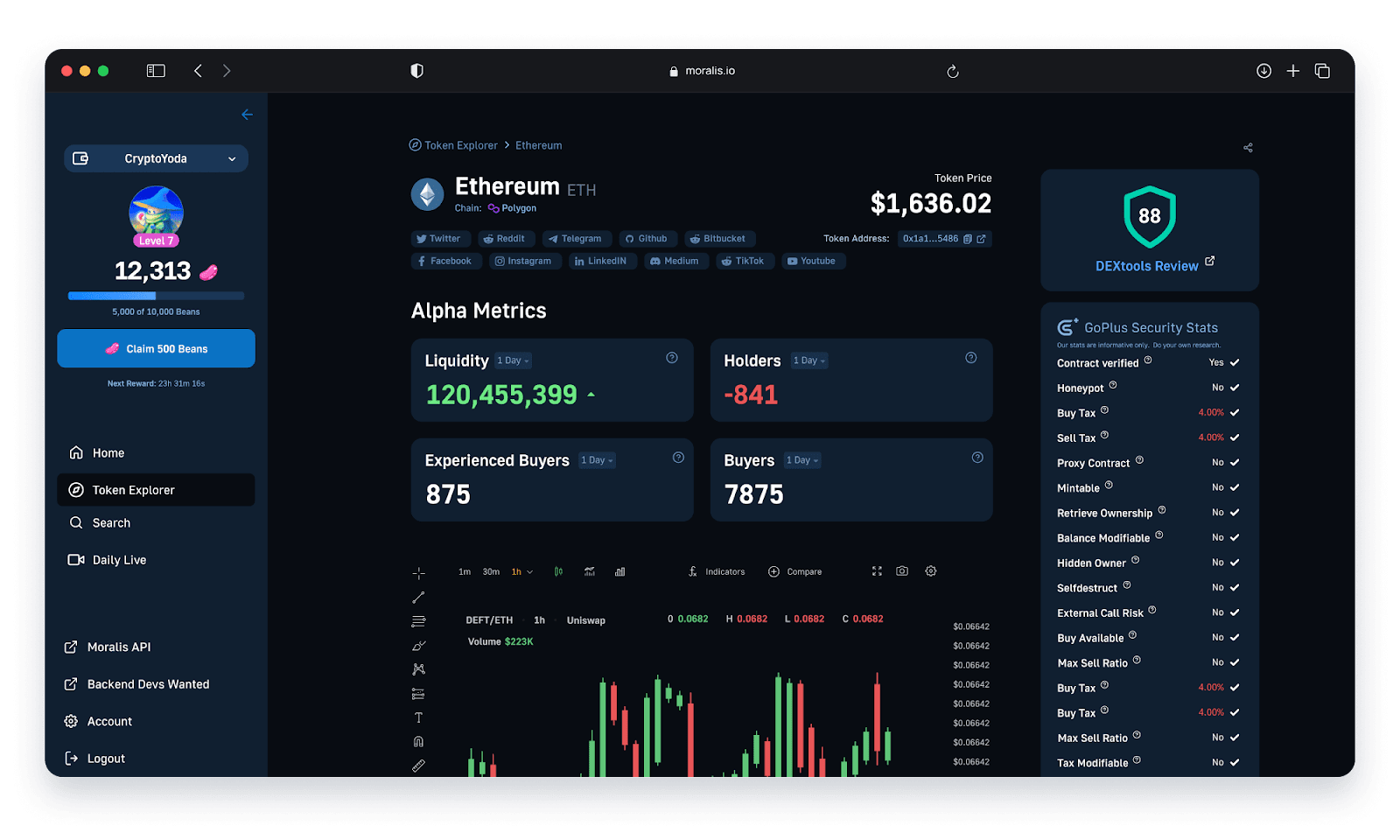
Portfolio Trackers: A portfolio tracker is a platform that accumulates data about user’s token holdings in one place, enabling them to seamlessly track and manage their altcoins. Some prominent examples include Delta, Kubera, and Moralis Money.
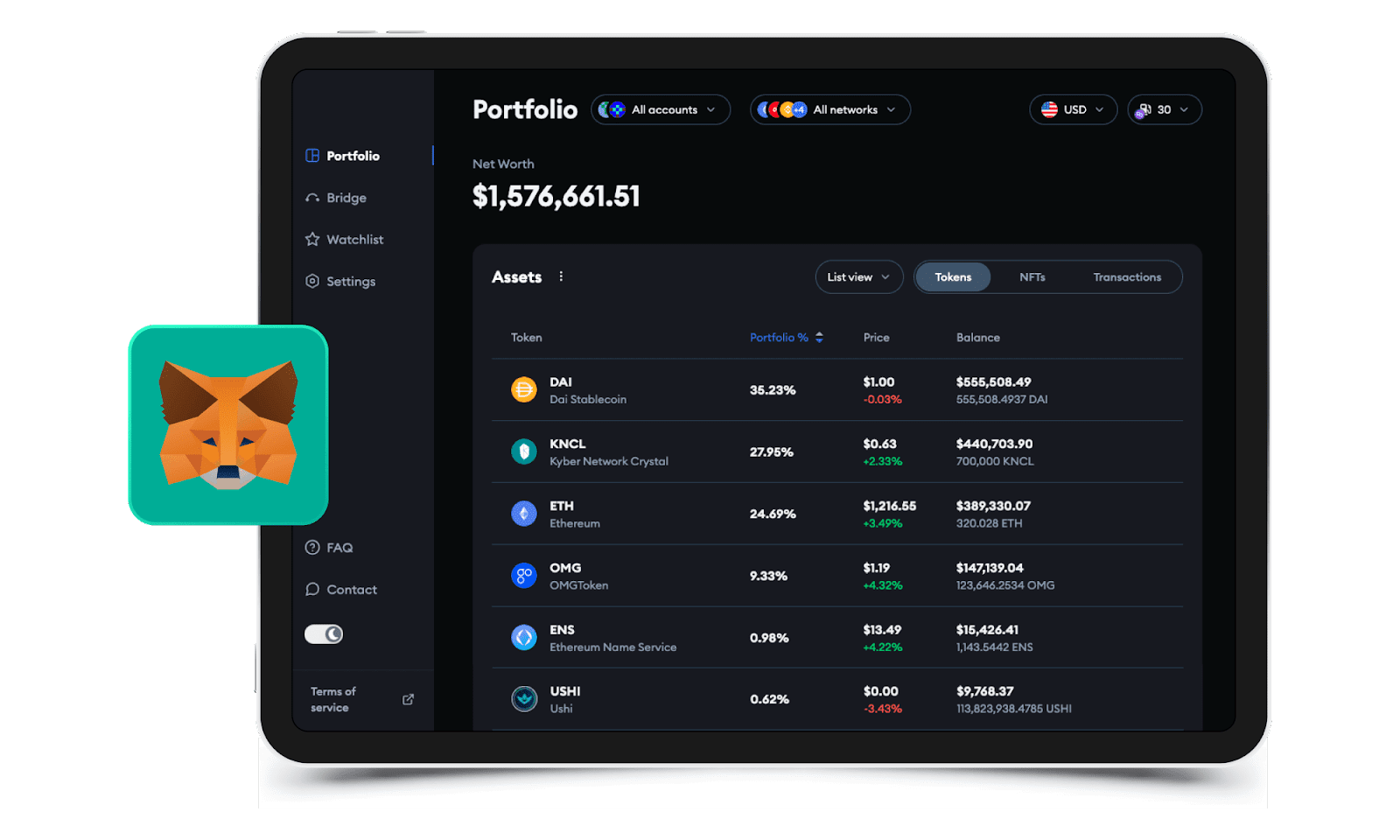
Decentralized Exchanges (DEXs): A DEX is a peer-to-peer marketplace allowing users to trade altcoins in a non-custodial manner without the need for intermediary involvement. Some prominent examples of existing DEXs include Uniswap, Curve, and PancakeSwap.
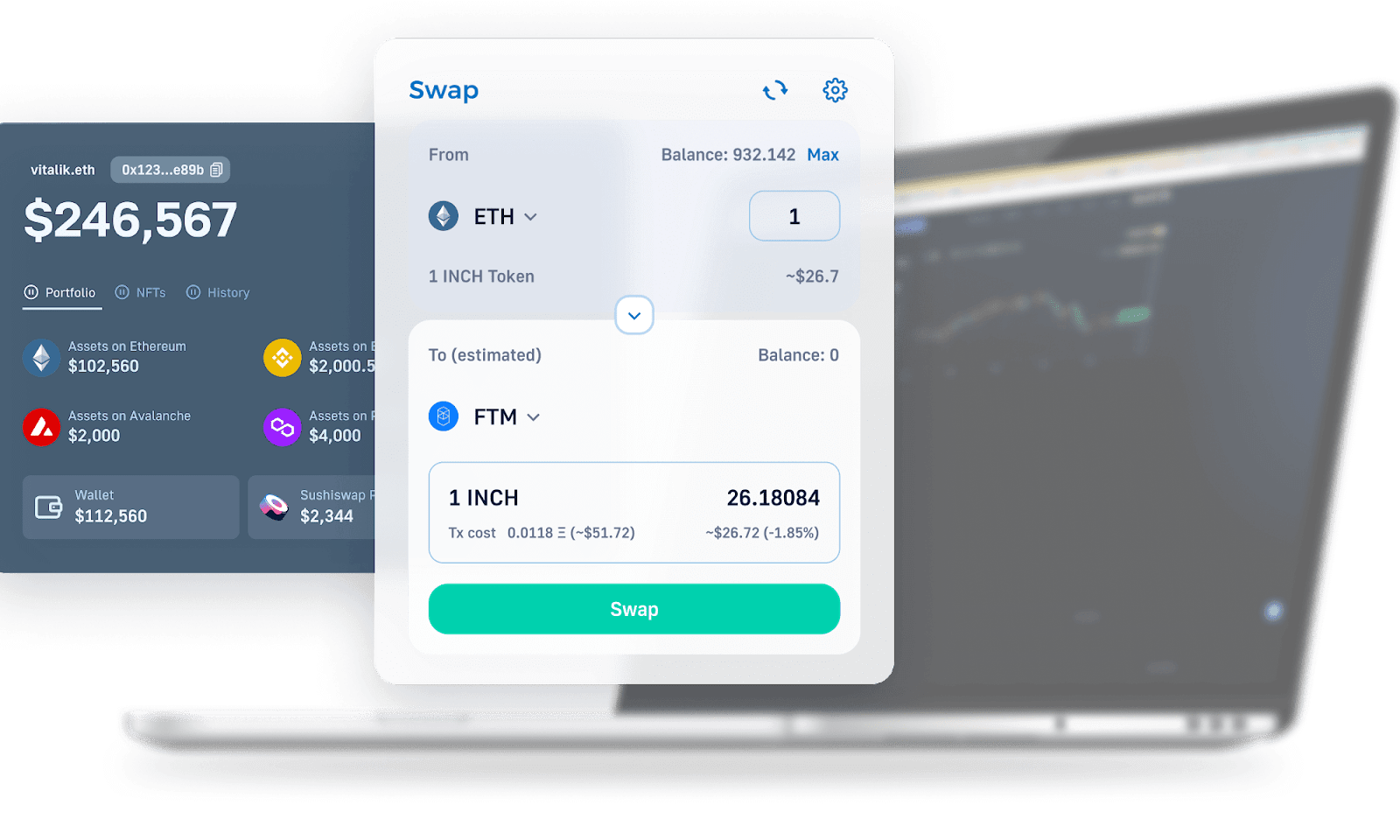
Token explorers, portfolio trackers, and DEXs are just three examples of what you can build with Moralis. Here, the only thing stopping you is your imagination!
Summary: What’s the Best Altcoin API for Setting Up Altcoin Data Feeds?
In today’s article, we introduced you to Moralis – the ultimate Web3 API provider for fetching and integrating altcoin data into your dapps. In doing so, we explored the following three altcoin APIs in further detail:
Token API: With the Token API, you can seamlessly get real-time and historical altcoin data. Market Data API: The Market Data API gives you access to advanced market insights. Streams API: With the Streams API, you can seamlessly set up Web3 alerts and notifications.
From there, we also showed you how to get altcoin data with Moralis’ API suite in three steps:
Step 1: Get a Moralis API KeyStep 2: Write a Script Calling the getTokenPrice() Endpoint Step 3: Run the Code
So, if you have followed along this far, you now know how to fetch and integrate altcoin data into your projects! If you liked this altcoin API tutorial, consider checking out more Moralis content. For instance, read our most recent guide on building cryptocurrency price trackers or explore the Cosmos ecosystem!
What’s more, if you liked what you saw throughout this tutorial, then you should know that we have a Candlestick API in the pipeline. For updates regarding this innovative API and notifications for when it’s released, please make sure to sign up with Moralis!





















